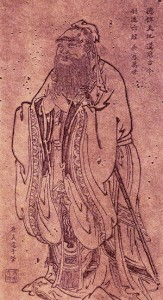Everywhere in China, even in Beijing’s iconic Tiananmen Square, statues of the great Chinese revolutionary heroes have often been replaced by those of Confucius, a sign that the master‘s school of thought has indeed been restored by the authorities.
What for centuries was the official face of Chinese civilization, before being rejected by the revolutionaries of the 20th century, has indeed made a return in recent years.

Confucius. Image source: Wikipedia
Anna Ghiglione is a professor in the Department of Philosophy at the Université de Montréal and the Centre for East Asian Studies, where she teaches notably Confucianism.
She begins by defining this school of thought as “a moral and political teaching that emphasizes the importance of choosing moral principles to achieve peace and harmony, first in oneself, then in family, society, and politics.” Thus, for Confucius, it is important for everyone to maintain and develop a moral conscience through the practice of virtue and study. She notes in this regard that Confucianism is “the only religious tradition in the world that, in the broad sense of the term, reveres teachers.”
Return of Confucian schools
The renewed interest in traditional values in Chinese society is reflected, among other things, in the opening of private Confucian schools. Professor Ghiglione notes that children in these schools receive an education based on virtues and learn classical Confucian texts by heart. While not abundant – around one hundred in the country – these schools are a clear sign of interest for these values. Ghiglione, who regularly travels to China to visit the landmarks of Confucianism, also talks about the emergence of a movement in China urging the Chinese government to recognize Confucianism as a religion, like Buddhism, Taoism, and Christianity.
Harmonious society and nationalism
On a political level, as well as a legal one, the signs of this return to Confucianism are numerous. In the past ten years, Confucius Institutes for the promotion of Chinese language and culture have sprouted around the world. Moreover, in 2005, President Hu Jintao decreed the “construction of a harmonious society” as a top priority of the government.
Ghiglione notes that some Confucian values are now even enshrined in law. This is the case for filial piety. In the current Chinese Constitution, children are legally obliged to support parents who can no longer look after themselves. An amendment adopted a few months ago strengthens this law and requires “children who live far from their birthplace to visit often their parents who are over 60 years of age.”
How is that the Communist Party of China, which refuted Confucianism 40 years ago, now submits to it? “The system is no doubt democratizing,” says Ghiglione. “Since the 1980s, there has been a revival of Confucianism because it is a kind of moral system for managing conflict, creating a harmonious society, and educating youth to certain values.” But this phenomenon of restoring the roots of Chinese tradition no doubt also illustrates “a legitimate national desire for self-defense against Westernization.”
Is there hope that this return to Confucianism will move the Chinese regime forward on the thorny issue of human rights? Ghiglione urges caution, noting that this is a modern concept that did not exist during the philosopher‘s time, either in China or elsewhere. Depending on how the texts are interpreted, they could lead to radically different conclusions. Some argue that Confucianism responds to particularly Asian values in which the group takes precedence over the individual, while supporters of the new philosophical Confucianism say exactly the opposite, that Confucian humanism is compatible with the liberalization of human rights and with Western capitalism. Ghiglione notes, however, that many founding principles of Confucianism advocate a democratic vision of human nature.
Confucius and… Quebec values
According to Professor Ghiglione, Confucius thought could help enrich current debate in Western societies, especially those dealing with the relationship between religion and the state. Confucianism is “neither a religion nor a doctrine advocating secularism,” she says, “it is a form of wisdom that is outside secularism, outside religion. Confucius was respectful of popular rites and beliefs and was able to find a balance between secularism and religion.” Indeed, the UdeM sinologist is exploring the possibility of bringing Confucianism into the ongoing debate in Quebec around Bill 60.
*Source: University of Montreal
